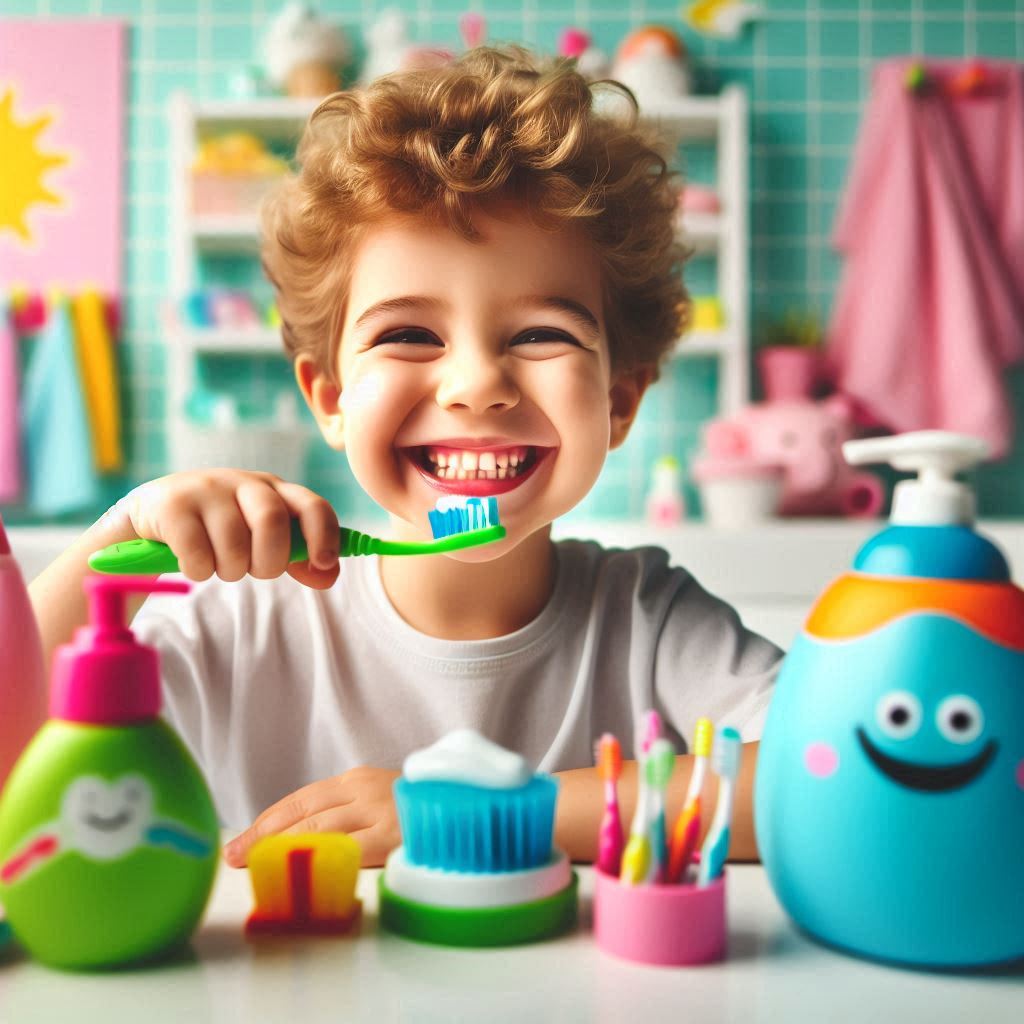Introduction
Self-care for kids is not just a buzzword—it’s an essential part of raising healthy, well-rounded children. Teaching self-care at a young age helps children build resilience, independence, and emotional intelligence. These skills are foundational for managing stress and maintaining good health throughout life.
Whether it’s physical care like brushing teeth or emotional care like managing stress, self-care helps children grow into confident and capable individuals. But what exactly is self-care for kids, and how can you as a parent foster these habits?
In this guide, we’ll explore everything you need to know about self-care for kids. From why it’s important to how you can instill self-care routines at different ages, you’ll find all the essential tools and tips to help your child thrive.
What is Self-care for Kids?
Self-care for kids refers to a range of activities that help children maintain their physical, emotional, and mental well-being. Unlike adults, children may not naturally understand the importance of these practices. That’s where parents and caregivers step in, guiding them through the habits and routines that will set the foundation for a healthy life.
Self-care for kids includes a wide variety of actions:
- Physical care: Personal hygiene (bathing, brushing teeth), eating healthy, getting exercise.
- Emotional care: Recognizing and managing feelings, self-soothing techniques, mindfulness.
- Social care: Building positive relationships, understanding boundaries, and creating supportive social connections.
While self-care practices for children will differ based on their age, the goal remains the same: to empower kids with the ability to take care of themselves and cope with life’s challenges.
Why is Self-care Important for Kids?
Self-care is important for kids because it teaches them how to manage their own well-being, which leads to healthier and happier lives. Children who learn to take care of themselves early are more likely to carry these habits into adulthood. But the benefits extend beyond just the individual child—self-care can also positively impact their relationships, performance in school, and overall mental health.
Here’s why self-care matters:
- Mental and Emotional Benefits: Self-care helps children develop emotional regulation skills, so they can better manage feelings like anger, sadness, or frustration. In fact, studies show that children who practice emotional self-care are less likely to experience chronic stress and anxiety.
- Boost in Self-esteem and Confidence: When kids learn how to care for themselves, they feel more independent. They gain confidence in their abilities, whether it’s brushing their own hair or handling complex emotions. This boost in self-esteem contributes to their overall happiness and success in social settings.
- Improved Physical Health: Self-care habits like exercising, eating nutritious meals, and maintaining good hygiene have a direct impact on a child’s physical health. According to the American Academy of Pediatrics, regular self-care activities, such as getting enough sleep and staying active, are crucial for growth and development in kids.
- Lifelong Habits: Teaching self-care from an early age sets the stage for lifelong habits. Children who develop a healthy self-care routine are more likely to maintain these practices as they grow older, leading to better health outcomes in adulthood.
Key Takeaway:
Self-care for kids is not just a nice-to-have; it’s a critical component of their development, helping them manage stress, build independence, and maintain physical health.
Key Areas of Self-care for Kids
Self-care for kids can be divided into three main areas: physical, emotional, and mental/social care. Let’s dive deeper into what each area entails and why it’s essential for children’s growth.
Physical Self-care
Physical self-care involves taking care of the body through proper hygiene, exercise, sleep, and nutrition. These habits form the foundation for a child’s health and well-being.
Key elements of physical self-care include:
Sure! Here’s a more readable version of your content on hygiene, sleep, exercise, and nutrition for kids:

Read More: Is Unplugging from Social Media the Key to a Great Family Vacation?
Hygiene
Teaching kids about proper hygiene is essential for their health and self-esteem. Here are some key practices to focus on:
- Handwashing: Encourage kids to wash their hands regularly, especially before meals and after using the restroom.
- Tooth Brushing: Make brushing teeth a fun routine. Let them pick out a favorite toothbrush and toothpaste to make it more enjoyable.
- Bathing: Regular baths or showers help kids feel clean and confident. Consider using special soaps or bath products that they enjoy.
By making hygiene fun and engaging, children will be more likely to adopt these habits and avoid illness.
Sleep
Sleep is crucial for a child’s growth and development. Here’s how much sleep kids need at different ages, according to the CDC:
- Infants (0-1 year): 12-16 hours of sleep per day
- Toddlers (1-2 years): 11-14 hours per day
- Preschoolers (3-5 years): 10-13 hours per day
- School-age children (6-12 years): 9-12 hours per day
To help kids get the sleep they need, establish a consistent bedtime routine. This routine can include calming activities, like reading or listening to soft music, to prepare them for a good night’s sleep.
Exercise
Physical activity is vital for children’s health. Kids should aim for at least 60 minutes of exercise every day. Here are some fun ways to keep them active:
- Active Play: Encourage activities like running, jumping, or swimming. These not only keep kids fit but also help develop their motor skills and reduce the risk of obesity.
Incorporating play into exercise can make it enjoyable and beneficial for your child’s overall health.
Nutrition
Teaching children about balanced nutrition is a fundamental aspect of self-care. Here are some guidelines:
- Variety is Key: Offer a range of fruits, vegetables, lean proteins, and whole grains to support their physical and cognitive growth.
- Healthy Choices: Involve kids in meal planning and preparation to help them learn about healthy eating habits.
By instilling good nutrition habits early on, you set your child up for a healthier future.
Self Emotional care
Ways to promote emotional self-care include:
- Expressing Feelings: Encourage kids to talk about their emotions. Use age-appropriate language to help them identify feelings like happiness, anger, or sadness.
- Mindfulness Activities: Teaching mindfulness can help kids stay calm and focused. Simple activities like deep breathing exercises or listening to relaxing sounds can make a huge difference.
- Positive Reinforcement: Use positive reinforcement to reward your child for managing their emotions well. This builds their self-esteem and encourages emotional growth.
Mental and Social Self-care
Mental and social self-care focuses on providing kids with the tools to handle challenges, make friends, and manage downtime. Teaching children how to balance their mental energy is just as important as taking care of their physical and emotional needs.
Key aspects of mental and social self-care include:
- Downtime and Relaxation: Kids need time to unwind and recharge. Activities like reading, drawing, or simply spending time outdoors can help children relax and focus on their mental well-being.
- Screen Time Management: According to the American Academy of Pediatrics, children aged 2-5 should have no more than one hour of screen time per day, while older children should balance screen use with physical activities and sleep.
- Building Friendships: Encouraging positive friendships and teaching kids about boundaries is important for their social well-being. Group activities and playdates can help children build these connections and understand the value of healthy relationships.
Read More: Should Teens Be Reading Colleen Hoover’s Books?
This section gives a comprehensive overview of what self-care for kids encompasses. Each area—physical, emotional, and mental/social care—contributes to a child’s overall health and development.
How to Teach Self-care to Kids at Different Ages
Teaching self-care to kids requires an age-appropriate approach because children at different developmental stages have varying levels of understanding and capability. Tailoring self-care lessons to your child’s age will make the process smoother and more effective. Here’s a breakdown of how you can instill self-care habits at different stages of a child’s growth:
Toddlers (1-3 years old)
Children are learning basic life skills and beginning to develop independence at this age. While toddlers may not be able to fully take care of themselves, you can start introducing simple self-care habits.
Here’s how to teach self-care to toddlers:
- Hygiene Habits: Start with basics like washing hands. Toddlers love routine, so make handwashing before meals and after playtime part of their daily schedule. Let them use a fun soap or sing a song while washing their hands to make it engaging.
- Brushing Teeth: At around 18 months, you can introduce toothbrushing. Let them pick a toothbrush with their favorite character to make it fun. While they may need help, it’s good to let them try brushing on their own to build independence.
- Self-feeding: Allow toddlers to use their hands or spoons to feed themselves, even if it gets messy. This helps develop fine motor skills and teaches them how to take care of their nutritional needs.
- Emotional Awareness: Toddlers are just starting to understand emotions. Use picture books or flashcards to talk about feelings like happiness, anger, or sadness. Helping them label their emotions early on lays the groundwork for emotional self-care.
Example: Case studies suggest that toddlers who are given the opportunity to make small decisions—like choosing their own clothes or deciding what toy to play with—develop a sense of independence earlier. This contributes to improved confidence and emotional self-regulation as they grow.
Preschoolers (3-5 years old)
Preschoolers are more capable of understanding routines and following instructions. At this stage, children are eager to do things “by themselves,” which is an excellent opportunity to foster self-care habits.
Key self-care lessons for preschoolers include:
- Morning and Bedtime Routines: Preschoolers thrive on routines. Establish a morning routine that includes brushing teeth, washing their face, and getting dressed. Similarly, a bedtime routine that involves changing into pajamas, brushing teeth, and reading a story helps them wind down and prepares them for restful sleep.
- Independence in Dressing: Encourage preschoolers to dress themselves. This is not only a practical skill but also boosts their confidence in taking care of themselves. You can make this easier by organizing clothes in a way that they can choose their outfit with minimal help.
- Healthy Eating Habits: Involve them in making healthy food choices. For example, let them pick between two healthy snacks. This gives them control over their choices while steering them toward nutritious options.
- Encouraging Self-expression: Preschoolers are developing language skills and can express themselves better. Encourage them to talk about their day, their feelings, and any challenges they may be facing. Art and storytelling can be great tools for emotional self-expression.
Fact: According to the American Psychological Association, establishing routines in early childhood helps reduce anxiety and behavioral problems in preschoolers. Kids who follow routines are also more likely to transition smoothly into school environments.
School-age Kids (6-12 years old)
By the time children reach school age, they are more independent and can take on more responsibility when it comes to self-care. At this stage, it’s about reinforcing habits and introducing new responsibilities.
Self-care practices for school-age kids include:
- Personal Hygiene Routines: School-age kids should be capable of maintaining personal hygiene independently. This includes brushing teeth, showering, and managing their appearance (like combing their hair). You can help them create a personal care schedule and reward consistency with praise or small incentives.
- Empowering Healthy Food Choices: At this age, children can start learning about the importance of a balanced diet. Involve them in meal planning and grocery shopping, teaching them how to read food labels and make healthy decisions.
- Stress-relief Techniques: School-age children may start experiencing stress, whether from school or social interactions. Introduce them to simple stress-relief techniques like deep breathing exercises or journaling. These skills are essential for emotional self-care.
- Physical Activity: Encourage at least 60 minutes of active play or structured exercise every day. Team sports, dance, or even simple activities like riding a bike are excellent ways to keep them active and healthy.
Quote: “Children who practice consistent hygiene and self-care habits by school age are better equipped to handle transitions into adolescence, reducing the likelihood of physical and emotional health issues,” says Dr. Laura Markham, author of Peaceful Parent, Happy Kids.
Tweens and Teens (13+ years old)
As children enter their teenage years, self-care becomes even more critical. During this time, they are navigating hormonal changes, increased social pressures, and the transition to adulthood. Self-care practices can help them maintain physical health, manage stress, and develop a strong sense of self-awareness.
Self-care tips for tweens and teens include:
- Self-awareness and Mental Health Check-ins: Encourage teens to regularly check in with themselves emotionally and mentally. Teach them to recognize signs of stress, anxiety, or burnout and how to take breaks when needed. Journaling, meditation, or talking to a trusted adult can be helpful tools.
- Healthy Social Media Habits: Social media can have both positive and negative effects on teens. Help them set boundaries for screen time and encourage them to focus on real-life connections. Open discussions about the impact of social media on mental health are crucial for guiding them through this digital age.
- Personal Boundaries: As teens begin to explore more complex social relationships, teaching them about personal boundaries and self-respect is essential. This includes understanding consent, knowing when to say no, and recognizing unhealthy relationships.
- Physical Health: Teens should continue to practice good hygiene, stay active, and eat balanced meals. Encourage them to take responsibility for their health by scheduling their own medical check-ups and making informed decisions about their bodies.
Data: According to a 2020 study published in JAMA Pediatrics, teens who engage in regular self-care practices, such as adequate sleep, balanced nutrition, and mindfulness activities, report lower levels of depression and anxiety compared to those who do not.
Each age group requires a different approach to teaching self-care, but the goal remains the same: to empower children with the knowledge and habits they need to take care of themselves. Tailoring your approach based on your child’s developmental stage will make self-care more effective and enjoyable.
How to Create a Daily Self-care Routine for Kids
Building a self-care routine for kids can seem daunting, but the key is to start small and keep it consistent. A daily routine helps children understand the importance of taking care of their physical, emotional, and mental well-being. As kids grow, they can adjust their routines to fit their evolving needs.
Below is a step-by-step guide to creating a self-care routine for kids, followed by a sample routine for different age groups.
Step 1: Start with the Basics
To build a routine, begin with essential self-care tasks. Start by focusing on physical care activities like hygiene, sleep, and nutrition. These basic self-care habits should form the foundation of your child’s daily routine.
- Morning Hygiene: Teach children to wash their face, brush their teeth, and get dressed every morning. These tasks set a positive tone for the day and reinforce the importance of taking care of their appearance and hygiene.
- Nutritious Meals: Schedule consistent mealtimes with balanced, healthy options. Encourage children to participate in meal preparation to develop an interest in healthy eating habits.
- Physical Activity: Include at least 30-60 minutes of physical play or exercise in their routine. This can be through outdoor play, sports, or simple activities like running or riding a bike.
- Bedtime Routine: A consistent bedtime routine is crucial for ensuring that kids get enough sleep. Activities like reading a book or listening to calming music can help children wind down before bed.
Step 2: Add Self Emotional care
Once the basics are in place, introduce activities that focus on emotional well-being. Emotional self-care is about helping kids recognize, express, and manage their feelings.
- Daily Check-ins: Encourage kids to talk about their day, including any challenges or emotions they faced. This fosters emotional awareness and helps them process their feelings.
- Mindfulness Practices: Introduce mindfulness activities, like deep breathing exercises or gratitude journaling, to help kids manage stress and build emotional resilience. Even 5-10 minutes a day can make a difference in their emotional well-being.
- Positive Affirmations: Incorporate positive affirmations into their day to boost self-esteem. Encourage your child to repeat phrases like, “I am strong,” or “I can handle challenges,” to build confidence.

Step 3: Incorporate Social Self-care
Social self-care is about helping children develop healthy relationships and learn how to interact with others in positive ways.
- Encourage Friendships: Schedule playdates or group activities where your child can socialize with peers. Encourage them to build friendships and practice sharing, cooperation, and empathy.
- Teach Boundaries: As children grow, teach them the importance of setting personal boundaries. Whether it’s saying no when they feel uncomfortable or knowing when to take a break from social interactions, boundaries are key to healthy relationships.
Step 4: Adjust for Age
Self-care routines should evolve as children grow. What works for a toddler won’t necessarily fit the needs of a teenager. Tailoring the routine based on your child’s age and abilities ensures that they continue to develop good self-care habits over time.
Sample Self-care Routine for Different Age Groups
Here’s a look at how daily self-care routines can vary by age group:
Toddlers (1-3 years old)
Here’s a simple table layout for the daily routine you provided:
| Time of Day | Activity |
|---|---|
| Morning | Brush teeth, wash hands and face, get dressed. |
| Mid-morning | Healthy snack and water. |
| Active Play | Outdoor time or free play indoors (running, climbing, etc.). |
| Nap Time | Quiet time after lunch, followed by a nap. |
| Afternoon | Storytime or engaging in a creative activity like coloring. |
| Evening | Dinner, bath time, and bedtime story. |
Preschoolers (3-5 years old)
Here’s a table for the revised daily routine you provided:
| Time of Day | Activity |
|---|---|
| Morning | Brush teeth, wash face, choose and put on clothes. |
| Breakfast | A balanced meal including fruits, whole grains, and protein. |
| Mid-morning Activity | Physical play like running or dancing. |
| Lunch | Focus on healthy options, including vegetables and lean proteins. |
| Quiet Time | Reading, puzzles, or other calm activities. |
| Afternoon Play | Playdates or solo play (building blocks, painting). |
| Evening | Dinner, bathtime, and a mindfulness activity (deep breathing or gratitude list). |
School-age Kids (6-12 years old)
Here’s a table for the daily routine you provided:
| Time of Day | Activity |
|---|---|
| Morning | Brush teeth, shower, and get dressed. Pack a healthy snack for school. |
| After School | 30-60 minutes of physical activity (sports, bike riding). |
| Homework Time | Allocate focused time for schoolwork. |
| Evening | Dinner with family. Allow children to help with meal preparation. |
| Wind-down Routine | Mindfulness activity (like journaling) followed by reading before bed. |
Teens (13+ years old)
Here’s a table for the daily routine you provided:
| Time of Day | Activity |
|---|---|
| Morning | Shower, personal hygiene routine, healthy breakfast. |
| Physical Activity | Engage in sports, exercise, or walk daily. |
| After School | Focus on schoolwork followed by a break for relaxation. |
| Social Time | Encourage safe and healthy socializing with friends or family. |
| Evening | Dinner and relaxation with a mindfulness activity (yoga, journaling) before bed. |
Key Takeaway:
Consistency is key when establishing a self-care routine for kids. The routine should be simple, age-appropriate, and flexible enough to adapt as children grow. By integrating physical, emotional, and social self-care habits into their daily lives, kids will learn to value their well-being and carry these lessons into adulthood.

The Importance of Self-care for Kids’ Mental Health
Mental health is just as important as physical health, especially in children. Teaching kids how to care for their mental well-being from an early age equips them with the tools they need to manage stress, build resilience, and develop a strong sense of self-awareness. In today’s fast-paced world, where children are often juggling school, social pressures, and extracurricular activities, focusing on mental self-care is critical.
Why Mental Health Matters for Kids
Children experience a range of emotions and challenges, just like adults. However, they often lack the language or understanding to express their feelings or manage stress. Ignoring mental health in kids can lead to long-term issues such as anxiety, depression, or behavioral problems.
Statistics: According to the CDC, approximately 1 in 6 children in the U.S. (aged 2-8) have a diagnosed mental, behavioral, or developmental disorder. The World Health Organization (WHO) also states that half of all mental health conditions begin by age 14, but most cases are undetected and untreated.
Teaching self-care for mental health at a young age helps children:
- Develop coping strategies: Children learn how to manage stress, frustration, and anxiety in healthy ways.
- Build emotional resilience: Kids who understand how to care for their mental health are more likely to bounce back from challenges or failures.
- Improve self-esteem: Engaging in mental self-care boosts confidence as children learn to trust their feelings and navigate their emotional world.
Signs a Child May Need More Focus on Mental Self-care
While all children benefit from mental self-care practices, some may need more focused support. Here are some signs that a child may be struggling with their mental health:
- Changes in Behavior: Sudden mood swings, irritability, or aggression can indicate that a child is having difficulty processing emotions.
- Withdrawal: If a child becomes socially withdrawn or stops engaging in activities they once enjoyed, this can be a red flag.
- Difficulty Sleeping: Insomnia or frequent nightmares could be signs of anxiety or stress.
- Physical Complaints: Children may not always express mental distress in words but instead complain of physical symptoms like stomach aches or headaches that don’t have a clear medical cause.
Fact: The National Alliance on Mental Illness (NAMI) reports that children with mental health issues are more likely to experience academic challenges, social isolation, and difficulty transitioning into adulthood if their needs go unmet.
H3: Simple Mental Self-care Strategies for Kids
Parents can help kids build mental resilience and emotional intelligence through simple, age-appropriate self-care strategies. Here are a few techniques that work well for children:
1. Deep Breathing Exercises
Teaching children deep breathing techniques can help them manage stress and anxiety. The “4-7-8” breathing method, for example, is easy for kids to learn:
- Breathe in for 4 seconds through the nose.
- Hold the breath for 7 seconds.
- Exhale for 8 seconds through the mouth.
This type of controlled breathing has been shown to reduce stress hormones like cortisol and increase relaxation.
2. Journaling for Self-reflection
Encourage children to write about their feelings, either through a traditional journal or by drawing if they are younger. Journaling is a powerful way to process emotions and reflect on their thoughts.
- Gratitude Journals: Writing down three things they are grateful for each day can help kids focus on the positive aspects of their life.
- Emotion Journals: Having a space to explore their feelings helps children make sense of their emotions, particularly if they are struggling to communicate verbally.
3. Mindful Movement
Activities like yoga or stretching exercises not only promote physical health but also enhance mental well-being. Yoga is particularly effective because it combines movement with mindfulness, teaching kids how to focus on their body and breathe while calming their mind.
Research: A study published in Psychology Research and Behavior Management found that children who practiced yoga regularly reported better emotional regulation and reduced symptoms of anxiety compared to those who didn’t.
4. Art Therapy
Art therapy gives kids a creative outlet to express their feelings, especially if they are too young to articulate their emotions verbally. Encourage your child to draw or paint their feelings, allowing them to explore their emotions in a non-verbal way.
Example: A 2018 study from the International Journal of Art Therapy showed that children who engaged in creative arts therapies exhibited lower levels of anxiety and increased emotional resilience.
The Role of Parents in Supporting Kids’ Mental Self-care
Parents play a critical role in fostering mental self-care habits. It’s not just about teaching techniques but also modeling healthy behaviors. Here’s how parents can help:
- Create a Safe Space: Ensure that your child feels comfortable talking about their emotions without fear of judgment. Open conversations about feelings and mental health should be normalized within the family.
- Limit Screen Time: Excessive screen time, especially on social media, has been linked to anxiety and depression in children and teens. Set boundaries for digital use, and encourage face-to-face interactions and outdoor play.
- Encourage Problem-solving: Teach children how to solve problems on their own rather than always stepping in to fix things. This builds resilience and independence, both of which are crucial for mental well-being.
Quote: “Children are sponges—they absorb not only what you teach them, but also what you do. If parents show that they prioritize mental self-care, kids are more likely to adopt these habits as well,” says Dr. Tovah Klein, author of How Toddlers Thrive.
Key Takeaway:
Mental self-care is essential for children’s overall well-being. By teaching kids strategies like mindfulness, journaling, and deep breathing, parents can help them navigate life’s challenges with resilience. Early mental self-care practices can prevent long-term mental health issues and empower children to take control of their emotional health.
Physical Self-care for Kids: Building Healthy Habits Early
Physical self-care is the foundation of overall well-being for kids. Physically healthy children tend to perform better academically, have better emotional regulation, and develop strong social connections. The key to instilling healthy habits early is consistency, fun, and positive reinforcement.
In this section, we’ll cover the different aspects of physical self-care, from basic hygiene to exercise and proper nutrition, along with tips for parents to encourage these habits at home.
Why Physical Self-care is Critical for Kids
Children are constantly growing, both physically and mentally. Ensuring that they adopt physical self-care practices early sets the groundwork for a healthy future. Regular physical activity, good nutrition, and maintaining hygiene all contribute to:
- Boosted Immunity: Active kids with healthy diets are better able to fight off common illnesses like colds or infections.
- Stronger Bones and Muscles: Physical activity is essential for proper muscle development and bone density, which is especially important as kids grow.
- Improved Focus and Cognitive Function: Studies show that kids who engage in regular exercise perform better in school due to increased concentration and cognitive function.
- Emotional Regulation: Physical activity helps regulate mood and reduce stress by releasing endorphins, often called the “happy hormones.”
Fact: The CDC recommends that children and adolescents get at least 60 minutes of moderate to vigorous physical activity each day.
Essential Components of Physical Self-care for Kids
Physical self-care encompasses a variety of activities and habits that promote overall well-being. Here’s a breakdown of the essential components:
1. Daily Hygiene
Teaching proper hygiene habits is one of the most basic yet crucial forms of physical self-care. Personal hygiene not only helps keep kids healthy but also instills a sense of responsibility and independence.
- Handwashing: Frequent handwashing with soap and water is critical to prevent the spread of germs. Teach kids to wash their hands before meals, after using the restroom, and after playing outside.
- Dental Care: Brushing teeth twice a day and flossing are essential for oral hygiene. Establishing this habit early prevents cavities and other dental issues.
- Bathing and Grooming: Regular baths or showers help keep skin clean and free from bacteria. Older children can be taught to wash their hair regularly and take care of their nails.
Tip: Make hygiene fun by using colorful soaps, toothbrushes, or letting kids pick out their own bath products.
2. Nutrition
A balanced diet is a crucial part of physical self-care. Kids need a variety of nutrients to fuel their growing bodies and maintain energy throughout the day. Ensuring that they eat a range of healthy foods helps build a strong immune system, maintain a healthy weight, and support brain function.
- Fruits and Vegetables: Aim for at least five servings a day. Include a variety of colors to ensure they get a range of vitamins and minerals.
- Whole Grains: Swap refined grains for whole grains like brown rice, oats, and whole wheat bread. These provide essential fiber and keep energy levels stable.
- Lean Proteins: Include sources like chicken, fish, beans, and nuts to support muscle growth and repair.
- Hydration: Teach kids the importance of drinking water regularly. Limit sugary drinks like soda or juice, and encourage water as the main source of hydration.
3. Regular Physical Activity
As mentioned earlier, children need at least 60 minutes of physical activity each day. Exercise doesn’t have to be structured—it can come in the form of play, sports, or family activities. The goal is to keep kids moving, which helps with both physical fitness and mental health.
- Active Play: Encourage activities like running, jumping, and playing games like tag or hide-and-seek. These activities are fun and help kids burn off energy.
- Sports: Joining a sports team or taking up an individual sport like swimming or gymnastics can help kids develop coordination, teamwork, and perseverance.
- Family Activities: Make exercise a family affair by going for walks, bike rides, or playing sports together. Modeling active behavior encourages children to do the same.
Data: A 2019 study published in the Journal of Pediatrics found that children who engaged in physical activity at least 3 times a week had lower levels of stress and anxiety.
Creating a Physical Self-care Routine for Kids
Consistency is key to helping kids develop strong self-care habits. Here’s a sample physical self-care routine that can be tailored to your child’s needs:
| Time of Day | Activity | Purpose |
|---|---|---|
| Morning | Brush teeth, wash face | Start the day with personal hygiene and boost confidence. |
| Breakfast | Healthy meal (e.g., oatmeal with fruit) | Fuel the body with nutrients and energy. |
| Mid-morning | Active play or short walk | Encourage movement to boost mood and focus. |
| Lunch | Balanced meal with veggies, protein, and grains | Keep energy stable for the rest of the day. |
| Afternoon | 30-60 minutes of exercise (sports, biking) | Physical activity helps strengthen muscles and bones. |
| Evening | Brush teeth, shower/bath | Wind down and maintain cleanliness before bed. |
| Bedtime | Calm activity (like reading or meditation) | Help relax the body and mind for quality sleep. |
Tips for Encouraging Physical Self-care in Kids
Parents can play a significant role in reinforcing physical self-care by making it fun and engaging. Here are a few tips:
- Be a Role Model: Children learn by observing. When parents demonstrate good physical self-care, like eating well and exercising, kids are more likely to follow suit.
- Create Fun Challenges: Use games, apps, or fitness trackers to turn exercise into a friendly competition. For example, challenge your child to see who can do the most jumping jacks in a minute.
- Celebrate Progress: Reward consistent self-care with praise or a fun family activity. Positive reinforcement encourages kids to stick with their routines.
Key Takeaway:
Physical self-care is vital for kids’ growth and development. By establishing daily hygiene habits, promoting nutritious eating, and encouraging regular exercise, parents can help their children build a strong foundation for lifelong health. Small, consistent actions make a big difference in fostering a healthy, happy child.
Social Self-care for Kids: Fostering Healthy Relationships and Social Skills
Social self-care involves helping kids build and maintain positive relationships with others. Developing strong social skills at an early age is essential for emotional well-being and success in later life. Socially adept children are more likely to form meaningful friendships, communicate effectively, and navigate social challenges with confidence.
In this section, we’ll explore the importance of social self-care for kids, discuss signs that a child may need help with social skills, and offer strategies to support your child’s social development.
Why Social Self-care is Important for Kids
From learning how to share in kindergarten to collaborating on group projects in school, social interactions are a crucial part of a child’s development. Social self-care helps kids build the skills they need to interact with others, resolve conflicts, and form strong, healthy relationships.
Children with good social skills often:
- Form Healthy Friendships: Kids who engage in positive social self-care are better at making and maintaining friendships, which is important for their emotional health.
- Communicate Effectively: Socially healthy kids can express their needs, listen to others, and engage in meaningful conversations.
- Feel Connected and Supported: Having a network of friends or family provides children with a sense of belonging and emotional security.
Signs a Child May Need More Social Self-care
Social development varies from child to child, but there are signs that may indicate your child could benefit from more attention to their social self-care:
- Difficulty Making Friends: If your child struggles to connect with peers or has few or no close friends, they may need help building social skills.
- Frequent Conflicts: Kids who consistently have disagreements with others or cannot resolve conflicts may lack important communication or empathy skills.
- Shyness or Social Withdrawal: While some kids are naturally introverted, extreme shyness or avoidance of social situations may indicate a need for support.
- Fear of Social Situations: Anxiety about interacting with others, whether in school or other social settings, can signal that your child is struggling with social self-care.
Practical Strategies for Encouraging Social Self-care in Kids
There are many ways parents can encourage social self-care and help children build the social skills they need for positive relationships. Here are a few strategies to consider:
1. Encourage Social Play
Playtime is one of the most effective ways for children to develop social skills. Whether it’s at school, in the neighborhood, or during organized playdates, kids learn valuable lessons about cooperation, communication, and empathy through play.
- Organized Playdates: Arrange regular playdates with peers or siblings. These give children an opportunity to practice sharing, turn-taking, and resolving conflicts.
- Team Sports or Clubs: Encourage your child to join team-based activities, such as sports teams, dance classes, or after-school clubs. These environments foster teamwork, communication, and leadership skills.
Fact: A 2017 study from The American Journal of Play found that children who engage in regular social play develop better emotional regulation and problem-solving skills.
2. Teach Empathy
Empathy, or the ability to understand and share the feelings of another, is an essential social skill. Teaching empathy helps children navigate social situations with kindness and understanding.
- Talk About Feelings: Encourage your child to reflect on how others might feel in different situations. For example, after reading a story or watching a show, ask questions like, “How do you think that character felt when that happened?”
- Model Empathy: Show empathy in your daily interactions, both with your child and others. When your child sees you respond with kindness and understanding, they’re more likely to do the same.
3. Practice Active Listening
Active listening is a critical part of effective communication. Teaching kids to listen attentively when others are speaking helps them build stronger relationships and avoid misunderstandings.
- Games that Promote Listening: Play games like “Simon Says” or “Telephone” that require children to focus on listening and following instructions.
- Model Good Listening: Show your child what it looks like to be a good listener by giving them your full attention when they speak, making eye contact, and asking follow-up questions.
4. Teach Conflict Resolution Skills
Kids won’t always get along with others, so it’s important they learn how to handle conflicts in a healthy way. Teaching conflict resolution skills empowers children to navigate disagreements without escalating emotions or resorting to aggression.
- Role-playing: Act out common conflicts with your child and talk through ways to resolve them. For example, if a friend takes a toy without asking, discuss how your child can calmly ask for the toy back or offer to take turns.
- Encourage Problem-solving: When your child faces a disagreement, guide them through finding a solution rather than solving the problem for them. This helps them develop independence and confidence in resolving conflicts.
Creating a Social Self-care Routine for Kids
Having a routine for social self-care helps children make consistent progress in their social skills. Below is a simple social self-care routine that can be adapted for different ages:
| Time of Day | Activity | Purpose |
|---|---|---|
| Morning | Greet family members and practice polite conversation | Encourages social interaction within the family unit. |
| School/Daycare | Engage with peers in group activities or teamwork | Develops cooperation and communication skills. |
| After School | Playdate or family game night | Provides opportunities for socializing and practicing empathy. |
| Evening | Reflect on the day’s interactions (e.g., “What did you enjoy about playing with your friends today?”) | Encourages mindfulness about social experiences and emotional connections. |
The Role of Parents in Supporting Social Self-care
Parents are key in helping children develop strong social skills and habits. Here are a few ways you can support your child’s social self-care journey:
- Be a Positive Role Model: Children mimic what they see, so show them how to be respectful, kind, and communicative in your social interactions.
- Provide Opportunities for Socializing: Whether it’s inviting friends over for a playdate or enrolling your child in a team activity, create opportunities for your child to practice social skills in different settings.
- Encourage Reflection: Help your child reflect on their social experiences. Ask open-ended questions like, “What was your favorite part of playing with your friends today?” or “How did you handle that disagreement?”
Social Self-care for Different Age Groups
The way children practice social self-care evolves as they grow older. Below is a breakdown of key social skills to focus on at different stages of childhood:
- Toddlers (1-3 years old): At this age, children are learning about sharing and taking turns. Encourage them to engage in simple group activities where they can practice these skills.
- Preschoolers (3-5 years old): Preschoolers are beginning to form friendships and engage in imaginative play. Help them understand empathy and teach them how to resolve small conflicts.
- School-age Children (6-12 years old): At this stage, peer relationships become more important. Focus on teaching active listening, teamwork, and conflict resolution.
Key Takeaway:
Social self-care is an essential aspect of a child’s overall development. By encouraging positive social interactions, teaching empathy, and modeling healthy communication, parents can help their children build strong social skills that will serve them well into adulthood.
Physical Self-care for Kids: Building Healthy Habits for Growth and Well-being
Physical self-care is fundamental for children as their bodies grow and develop. Establishing healthy physical habits early on sets the foundation for lifelong wellness, supporting their energy levels, immune system, and overall physical and mental health. Physical self-care includes everything from proper hygiene and nutrition to regular physical activity and enough sleep.
In this section, we’ll delve into the importance of physical self-care, discuss key habits children should develop, and provide actionable tips to ensure your child stays healthy and strong.
Why Physical Self-care is Important for Kids
Physical health directly impacts a child’s ability to learn, focus, and engage in everyday activities. A strong body is essential for children’s development, and physical self-care habits help prevent illness, support cognitive functioning, and improve emotional well-being.
Fact: According to the Centers for Disease Control and Prevention (CDC), children who are physically active for at least 60 minutes a day perform better academically, sleep more soundly, and have better emotional regulation.
Good physical self-care helps children in several key areas:
- Growth and Development: Proper nutrition, sleep, and exercise are crucial for the physical development of bones, muscles, and organs.
- Energy Levels: Kids who eat well and stay active tend to have more energy throughout the day, which helps them stay focused and alert.
- Mental Health: Physical activity and healthy routines can reduce the risk of anxiety and depression in children by promoting the release of endorphins.
Key Physical Self-care Habits for Kids
Helping kids establish and maintain healthy physical self-care habits is an essential part of parenting. Below are some of the most important habits to encourage:
1. Regular Physical Activity
Physical activity is not only crucial for maintaining a healthy weight but also for strengthening bones, muscles, and the cardiovascular system. Kids should be encouraged to engage in fun, age-appropriate physical activities every day.
- Daily Movement: The CDC recommends that children get at least 60 minutes of physical activity each day. This can include activities like running, playing soccer, swimming, or even dancing around the house.
- Unstructured Play: Encourage free play, such as running outside, climbing on playgrounds, or playing tag. Unstructured play helps build motor skills and fosters creativity.
Case Study: A 2020 study published in the Journal of Pediatrics found that children who participated in at least 60 minutes of moderate to vigorous physical activity daily were less likely to experience symptoms of anxiety and depression compared to their less active peers.

2. Proper Nutrition
A balanced diet plays a vital role in a child’s physical and cognitive development. Ensuring kids eat a variety of nutrient-rich foods supports their growth, immune system, and mental focus.
- Key Nutrients: Essential nutrients for kids include calcium for strong bones, protein for muscle development, and omega-3 fatty acids for brain health. Incorporate a mix of fruits, vegetables, whole grains, and lean proteins into your child’s diet.
- Healthy Snacks: Instead of sugary or processed snacks, offer nutritious options like fruits, nuts, yogurt, or whole-grain crackers.
Fact: According to a report by Harvard’s T.H. Chan School of Public Health, children who eat balanced meals with plenty of fruits and vegetables are 35% less likely to develop chronic diseases such as obesity and diabetes later in life.
3. Consistent Sleep Routine
Adequate sleep is critical for children’s growth, memory consolidation, and mood regulation. A regular sleep schedule helps kids recharge both physically and mentally.
- Recommended Sleep: According to the American Academy of Pediatrics (AAP), children between 3 and 5 years old need 10-13 hours of sleep per night, while school-aged children (6-12 years) need 9-12 hours.
- Sleep Hygiene: Establish a consistent bedtime routine that includes calming activities like reading a book, dimming the lights, and avoiding screens for at least 30 minutes before bed.
Table: Recommended Sleep Hours by Age Group
| Age Group | Recommended Sleep |
|---|---|
| Toddlers (1-2 years) | 11-14 hours per night |
| Preschoolers (3-5) | 10-13 hours per night |
| School-aged (6-12) | 9-12 hours per night |
4. Proper Hygiene Practices
Teaching children good hygiene habits helps prevent the spread of illness and encourages self-respect and responsibility. Hygiene practices include regular handwashing, bathing, brushing teeth, and grooming.
- Handwashing: Teach your child to wash their hands regularly, especially before meals and after using the bathroom. This simple practice can prevent many illnesses.
- Oral Care: Encourage kids to brush their teeth twice a day and floss daily to prevent cavities and gum disease. Make brushing fun by using a timer or playing a song for two minutes.
Fact: According to the World Health Organization (WHO), regular handwashing can reduce the risk of respiratory infections by up to 21%.
Creating a Physical Self-care Routine for Kids
Consistency is key when it comes to building healthy physical habits. A structured routine can help ensure kids get the activity, nutrition, and rest they need every day. Here’s a sample daily routine that promotes physical self-care:
| Time of Day | Activity | Purpose |
|---|---|---|
| Morning | Eat a nutritious breakfast | Provides energy for the day and kickstarts metabolism. |
| Midday | Active play or outdoor time | Boosts physical fitness and releases pent-up energy. |
| Afternoon | Healthy snack (fruit, yogurt, etc.) | Fuels the body with essential nutrients. |
| Evening | Wind-down routine (bath, brushing teeth, storytime) | Prepares the body for restful sleep. |
The Role of Parents in Supporting Physical Self-care
Parents play a critical role in helping children develop and maintain healthy physical habits. Here are a few ways you can support your child’s physical self-care:
Here’s a table that organizes the key points you provided about encouraging healthy habits in children:
| Strategy | Description |
|---|---|
| Lead by Example | Children learn by watching their parents. By modeling healthy behaviors such as eating nutritious meals, staying active, and maintaining a consistent sleep routine, your child is more likely to adopt these habits. |
| Make Physical Activity Fun | Encourage your child to find activities they enjoy. Whether it’s riding a bike, playing soccer, or dancing in the living room, making exercise fun helps ensure they stay active. |
| Create a Healthy Environment | Keep your home stocked with healthy snacks, encourage screen-free zones, and establish family routines that prioritize wellness, such as family walks after dinner. |
Quote: “Physical self-care is the foundation of a child’s well-being. Ensuring that kids have a routine that supports healthy eating, exercise, and sleep sets them up for success in all areas of life,” says Dr. Tanya Altmann, a leading pediatrician and author.
Key Takeaway:
Physical self-care is an essential part of a child’s growth and well-being. By promoting healthy habits like regular physical activity, proper nutrition, sufficient sleep, and good hygiene, parents can help their children thrive physically, mentally, and emotionally.
Read More: Daily Self-care for Kids: A Complete Guide to Building Healthy Habits
10 Common Teenage Problems and Solutions: 10 Key Social Issues











1 thought on “Self-care for Kids: A Complete Guide to Building Healthy Habits”